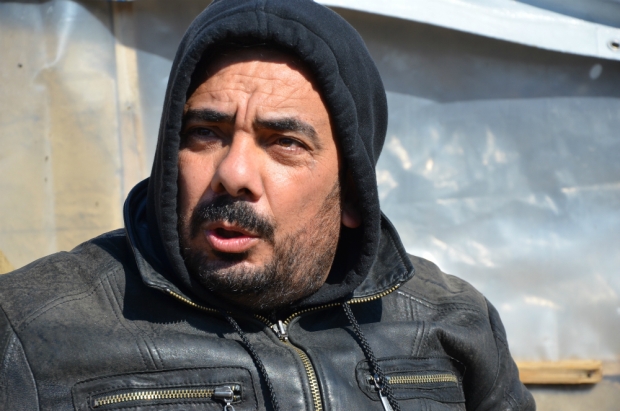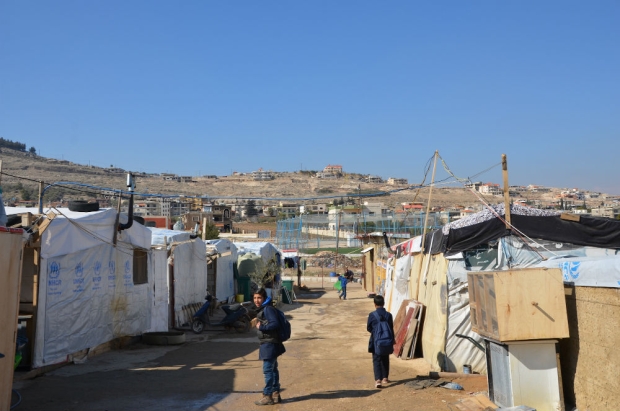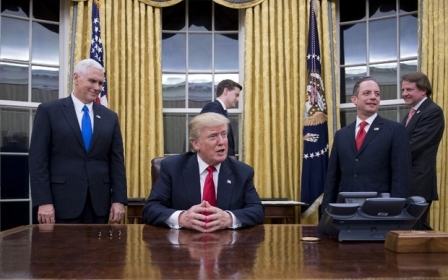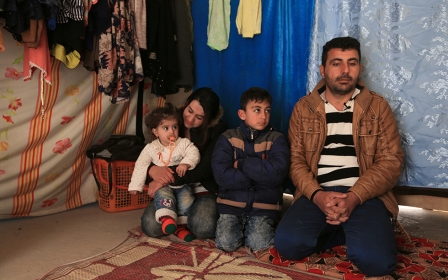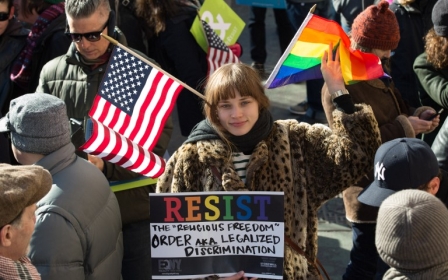'Trump is a racist donkey': Refugees in Lebanon watch US dreams slip away
MAJDL ANJAR, Lebanon - In this village on Lebanon’s border with Syria, Abou Ahmad, his wife and their four children sat despairingly in the derelict garage they call home.
When US President Donald Trump signed an executive order banning travellers and refugees from seven Muslim-majority nations including Syria last month, this family from Homs had been in the midst of their final preparations to cross the Atlantic.
Now, even with the temporary ban overturned by federal judges, Abou Ahmad fears his family’s American dream is slipping away.
'The image we have of America is going to change. Everyone in the world is going see America through bad eyes now'
“Our bags were nearly done. I had even arranged for my parents to come from Syria. I have not seen them in more than four years. I wanted to say goodbye,” the former house painter told MEE.
“I felt my life stopping. The formalities were going well, and suddenly, everything stopped. How do you want me to feel? Everything is blocked!”
Trump's next moves? Executive orders that could shape Middle East
Abou Ahmad’s family had been chosen to be part of a rare resettlement programme overseen by the United Nations.
The beneficiaries were selected from among those considered to be most vulnerable within the refugee population.
In the case of Abou Ahmad, he and his six-year-old son suffer from familial Mediterranean fever, a hereditary disease that causes frequent strikes of pain and severe fever. His wife is also epileptic.
“The most important reason for us to leave was the child. We want him to receive proper treatment as soon as possible,” said the boy’s mother.
Although the travel ban has been lifted, the resettlement programme is still on hold. Meanwhile, Abou Ahmad stares at the television for news of the United States.
'All Trump wants is tall blond people with blue eyes, where are we going to find them here?'
“I don’t understand, even the American people are protesting against the ban! It’s not like we stood at the gates of the embassy begging for asylum, we didn’t even chose to go to America. In the resettlement programme refugees are not allowed to chose the country where they will go, America chose us,” he said, clearly frustrated as he spoke.
About 100 Syrian refugees live in the nearby camp of Majdl Anjar 010 where the travel ban is the talk of the town, even among those with no plans to go to the US.
Abou Muharram, a middle-aged vet from Homs who now volunteers with local NGOs, is flabbergasted.
“This Donald Trump is a racist donkey. All he wants is tall blond people with blue eyes, where are we going to find them here?” he said, sitting with the young men from the camp.
“This is a racist decision, it is fundamentally unfair. In my mind, the United States was the country of freedom and democracy but this blows it away. The image we have of this country is going to change. Everyone in the world is going see America through bad eyes now.”
Since the beginning of the Syrian conflict in 2011, Lebanon has received over a million refugees, making it the country with the highest density of refugees worldwide.
According to the United Nations High Council of Refugees (UNHCR), 411 refugees who were due to be resettled to the US are now stranded in Lebanon including 195 Syrians.
On 3 February, the UN High Commissioner for Refugees, Filippo Grandi, expressed serious concerns about the consequences of the travel ban during a visit to Lebanon.
“Refugees share the very same concerns about security and safety that Americans have. They themselves are fleeing war, persecution, oppression and terrorism. The individuals and families UNHCR refers to governments for resettlement are the most vulnerable – such as people needing urgent medical assistance, survivors of torture, and women and girls at risk,” said Grandi.
“The new homes provided by resettlement countries are life-saving for people who have no other options. Those accepted for resettlement by the United States, after a rigorous US security screening process, are coming to rebuild their lives in safety and dignity.”
'Hiding from the world'
The refugees’ anxiety is also palpable in Beirut. Seifa lives in the popular district of Hamra. Like Abou Ahmad, she was also supposed to be resettled to the United States.
For this 36-year-old transgender Syrian national, the American dream meant walking down the street wearing a dress. Here, she lives locked up in her apartment because her change of sexual identity makes public appearances dangerous.
'The travel ban was a serious blow for me. My situation is really bad. I’m a refugee, I’m hiding from the world, people want to kill me'
“I feel threatened all the time. Once, I was hit with a knife. I was on the street with a friend, who was later resettled to a European country. They hit us both and then they stabbed me,” she recalled with a soft voice.
Although Lebanon is usually perceived as being one of the most LGBT-friendly countries in the region, homosexuality is illegal and punishable by up to a year in prison.
LGBT groups speak out against Trump's 'bigotry screening' for Muslims
Since she moved to Lebanon, Seifa has been arrested and jailed for several days twice. Although no legal charges were pressed against her, she said she was tied up, beaten and tortured with electricity.
“There are a lot of army and police checkpoints in Beirut. I am at risk of being arrested. I don’t want to go back to prison. I fear that if I go back, something very serious is going to happen to me.”
Seifa is also under threat from her family, which originates from a tribal village at the Syrian border with Iraq. In 2010 her uncle forced her to marry a woman.
She has not seen her family since but they are looking for her and have threatened to kill her a number of times.
'Should I commit suicide? They tell me I must wait but I’m not sure how long this can last'
The resettlement plan to the United States was her last hope for a better future.
“The travel ban was a serious blow for me. Since then, I’ve slept very little. I can’t stop thinking that if the United States doesn’t want me then no one else will,” she said.
“My situation is really bad. I’m a refugee, I’m hiding from the world, people want to kill me, I need to leave this place but what can I do? Should I commit suicide? They tell me I must wait but I’m not sure how long this can last,” she said, her hands shaking.
One of the only people who still visits Seifa regularly is Charlotte Bertal, the Syria case manager at IRAP Lebanon, an international NGO which provides legal assistance for people who sign up for resettlement programmes.
For Bertal, the travel ban measures are absurd because they are not based on legitimate fears.
“What needs to be clear is this executive order has no rational justification. Refugees are not a threat to the United States. Before they receive a visa, the US administration screens their profiles multiple times. A terrorist would never try to access America that way,” she said.
“This decision has devastating effects on the refugees. We are talking about people who have been waiting for months, sometimes years for a chance of a new life. Today, they are deprived of freedom.”
Middle East Eye propose une couverture et une analyse indépendantes et incomparables du Moyen-Orient, de l’Afrique du Nord et d’autres régions du monde. Pour en savoir plus sur la reprise de ce contenu et les frais qui s’appliquent, veuillez remplir ce formulaire [en anglais]. Pour en savoir plus sur MEE, cliquez ici [en anglais].


